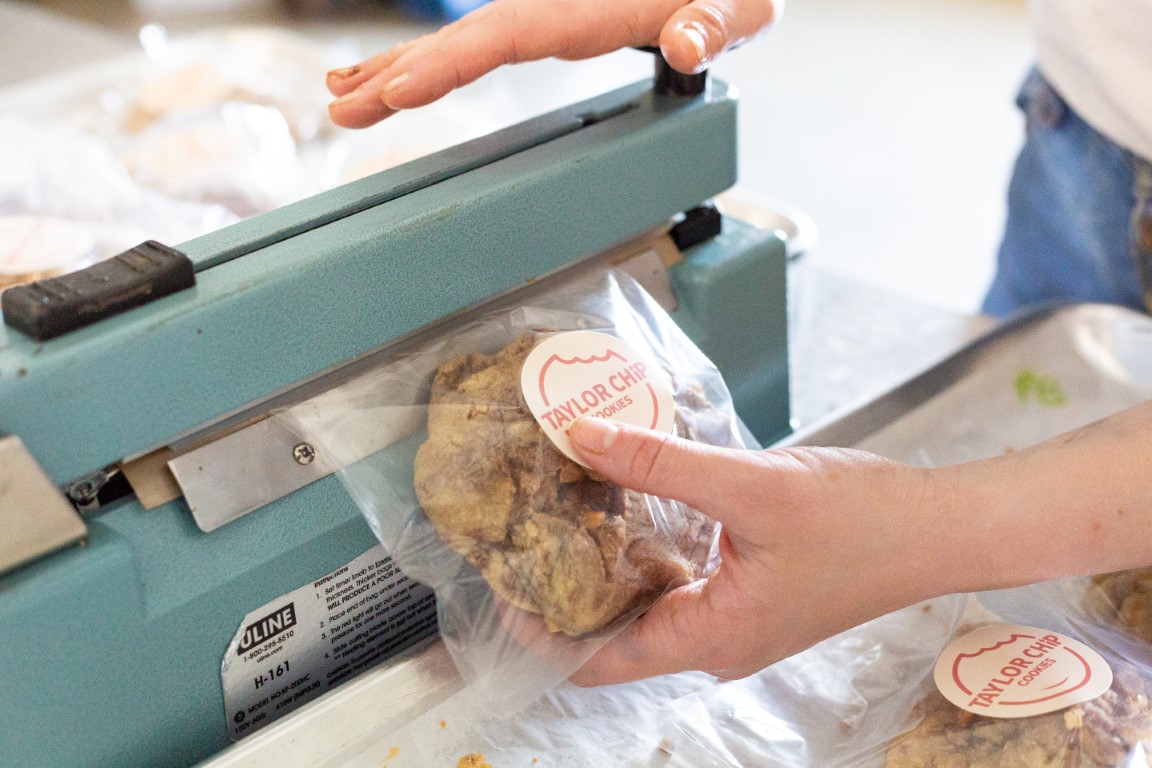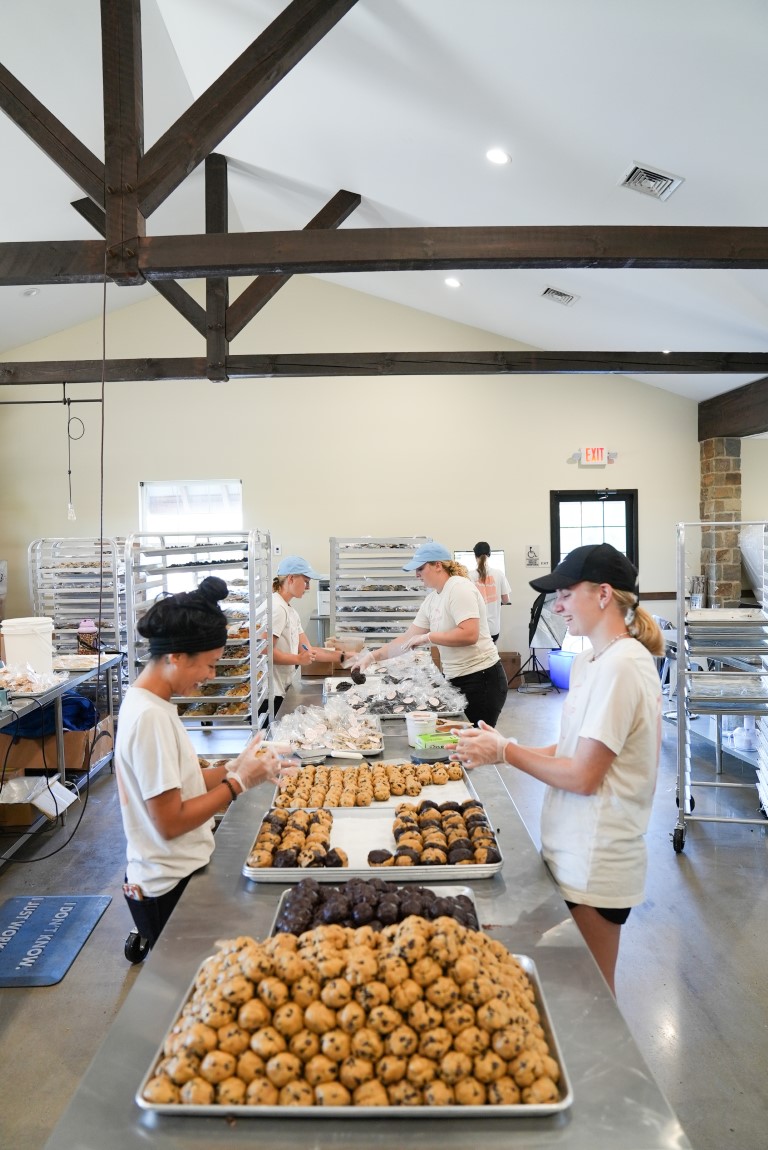Eggs play a vital role in cookie baking, impacting structure, moisture, and flavor. They act as a binding agent, holding ingredients together for cohesive dough and a smooth batter. Egg whites contribute to texture and crumb, while yolks add richness and prevent cookies from drying out. Eggs also influence leavening, making cookies lighter and aiding in color and flavor enhancement. Proteins and fats in eggs drive essential chemical reactions and contribute to a tender, buttery crumb. Understanding the balance between these components can help you produce cookies with the perfect texture and appearance, and there's much more to explore.
Key Takeaways
- Eggs act as a binding agent, holding cookie ingredients together for better structure.
- They provide moisture and richness, preventing dryness and enhancing flavor.
- Eggs contribute to leavening, helping cookies rise for an airy texture.
- The proteins and fats in eggs influence the cookie's texture and appearance.
- They enhance flavor and color, creating visually appealing and delicious cookies.
Understanding Egg Components
When you look at an egg, you're seeing a source of structure and nutrition that plays an essential role in baking cookies. The egg's components, primarily the yolk and white, offer different benefits that set them apart from other baking ingredients, like flour or sugar. Understanding how these components interact, you'll see why eggs contribute to both the texture and taste of your cookies in ways other ingredients can't quite match.
Structure and Nutritional Content of Eggs
Eggs are a culinary force, serving as both a structural backbone and a source of nutrition in cookie recipes. The egg whites and yolks play distinct roles, with egg whites contributing to building structure and providing a delicate crumb, while the fats in egg yolks add richness and a balance of moisture. Egg sizes matter in baking, affecting the overall structure and nutritional content.
When you use eggs in baking, you utilize their unique properties to enhance texture and flavor. However, common egg replacements like applesauce or flaxseed can serve similar functions if eggs aren't available.
- Why eggs give cookies a satisfying texture
- How yolks add richness and moisture
- The importance of choosing the right egg size
- Uncovering alternatives for egg replacements
- Achieving the perfect cookie balance
How Eggs Differ From Other Baking Ingredients
Baking ingredients work together to create delightful textures and flavors, but eggs stand out due to their unique components. When a recipe calls for eggs, it's recognizing the binding, leavening, and moisture-retaining properties that eggs in baking provide. The type of egg, such as medium eggs, can influence the outcome of your baking effort. While the beauty of baking lies in its flexibility, finding a suitable replacement per egg can be tricky as no ingredient fully mimics eggs in cookies. Additionally, baking with eggs requires caution to prevent cross contamination. Understanding these elements helps you utilize the strength of eggs, ensuring your cookies achieve the desired texture and flavor, making them an essential component in your baking repertoire.

Choose Your Own Delightfully Perfect Cookies.
With almost 30 flavors to choose from, you can make your box as unique as you are.
Primary Functions in Cookie Baking
When you bake cookies, eggs play several important roles that contribute to their overall quality. They provide binding properties that help maintain the structure, and their leavening effects can influence the texture, making cookies softer or fluffier. Additionally, eggs add moisture and richness, enhance flavor, and aid in color development, ensuring your cookies are not only delicious but also visually appealing.
Binding Properties for Structure
Incorporating eggs into your cookie dough is vital for achieving the right structure and texture. Eggs act as a binding agent, holding the ingredients for cookies together during the baking process. This binding property is essential because it helps form a smooth batter, which leads to a well-structured finished product. The proteins in baking eggs cookies interact with gluten strands, enhancing your cookie's structured texture. Mastering these binding properties can greatly improve your baking skills, resulting in cookies that hold together perfectly.
Consider these benefits of including eggs in your cookie recipes:
- The comforting aroma of cookies baking fills your home.
- Enjoying the satisfaction of a perfectly baked cookie.
- Sharing your delicious creations with loved ones.
- Relishing the joy of crafting homemade treats.
- Experiencing the pride of improving your baking skills.
Leavening Effects on Texture
While eggs are excellent binders, they also play a key role in leavening, which impacts your cookies' texture. The leavening effects from eggs are essential when combined with baking soda and baking powder, helping your cookies achieve an airy texture. Eggs can give you a cake-like texture or a velvety texture due to the moisture content they provide. If you're aiming for a creamy texture, consider adding an extra yolk. This not only enhances richness but also delivers a firmer texture. The proteins in eggs work with leavening agents, causing the dough to rise and create a more open crumb structure. Understanding how eggs influence your cookie's texture allows you to create your desired consistency and flavor profile.
Moisture and Richness Contribution
The allure of a perfectly baked cookie often lies in the moisture and richness that eggs contribute. When you incorporate eggs in your baking recipes, you're ensuring a batch of cookies with a rich flavor and buttery richness. Different types of eggs can affect the moisture and richness contribution, influencing the texture and taste of your baked goods. As a seasoned baker, understanding how eggs work can lead to baking success with an airier product and extra-rich flavor. Here's why eggs are essential:
- They bind ingredients, creating a cohesive dough.
- Eggs add moisture, preventing dryness.
- They enhance the overall rich flavor.
- Eggs contribute to the buttery richness.
- They help your cookies achieve an airier texture.
Master these elements, and boost your cookie-baking game.
Flavor Enhancement and Color Development
Beyond their role in moisture and richness, eggs greatly enhance flavor and develop color in your cookies. When you follow a chocolate chip cookie recipe, eggs contribute to a balance of richness and introduce a buttery flavor. The proteins in eggs help blend ingredients like brown sugar and chocolate chips, resulting in a consistent, basic flavor. During the baking procedure, eggs facilitate a beautiful color by reacting with the sugars, creating a desirable brown color that baking enthusiasts seek. This reaction not only affects the appearance but also the taste, bringing out the full potential of each ingredient. Using eggs guarantees that your cookies have a harmonious blend of taste and color, elevating them from ordinary to extraordinary.
Science Behind Egg Performance
When you add eggs to your cookie dough, you're introducing proteins and fats that play essential roles in the baking process. These components undergo chemical reactions in the oven, affecting the cookie's texture and appearance. The proteins help provide structure, while the fats contribute to a tender crumb, ensuring your cookies are both chewy and visually appealing.
Role of Proteins and Fats
In considering the role of proteins and fats in eggs, you'll find they're essential to a cookie's texture and structure. Proteins help give cookies their shape and stability, while fats contribute to a buttery texture. In chocolate chip cookies, eggs act as a secret ingredient that enhances the crisper or crunchy texture you love. The balance of proteins and fats affects how your cookie recipes turn out, influencing the ratio of chocolate chips to dough in each delightful batch of chocolate chip cookies. Understanding this balance is part of the art of baking, something you might learn in baking school.
- Imagine biting into that perfect crunchy texture.
- Revel in the buttery texture that melts in your mouth.
- Uncover the secret ingredient behind the taste.
- Master the art of baking.
- Perfect each batch of chocolate chip cookies.
Chemical Reactions During Baking
Eggs' role in cookie baking extends into the field of chemistry, where they help drive essential reactions during baking. As you begin your baking journey, understanding how eggs interact with a bowl of ingredients can enhance your status from an avid baker to a baking master. In sugar cookie baking, eggs bind with other elements, contributing to the alchemy of baking by emulsifying fats and water. This process stabilizes your mixture, ensuring uniformity. Eggs also play a vital role in the baking game by providing moisture, which reacts with flour and sugar to create a chewy texture. Keep a baking journal to track these chemical transformations, and soon you'll join the ranks of baking pros, mastering the art of perfect cookies.
Impact on Cookie Texture and Appearance
From the moment you crack an egg into your cookie dough, it starts to work its magic, influencing both texture and appearance. Eggs contribute to an airy structure, similar to how they work in angel food cake or cake recipes like yellow cake. They add moisture to the cake batter, helping achieve that desirable white color and soft texture. Using different flours, such as almond flour or bread flour, can also affect the final outcome. Eggs bind ingredients, creating a cohesive dough and enhancing flavors, whether natural or artificial. They are wild-card ingredients that can transform your cookies entirely.
- Imagine the thrill of achieving the perfect cookie texture.
- Feel the satisfaction of a well-crafted dough.
- Relish in the delightful aroma of baking.
- Savor the joy of a golden-brown finish.
- Experience the surprise of unexpected flavors.
Practical Baking Applications
When baking cookies, you can adjust egg ratios to achieve different textures, such as using fewer eggs for a denser cookie or more for a cakier result. If you need to replace eggs, consider common substitutes like applesauce or flaxseed, each bringing unique effects on texture and flavor. Encountering cookie issues like spreading or dryness often ties back to egg-related adjustments, so understanding these relationships helps troubleshoot effectively.
Adjusting Egg Ratios for Different Cookie Types
By adjusting the ratio of eggs in your cookie recipes, you can greatly alter the texture and flavor profile of the final product. Using more eggs might yield a result similar to an angel food cake batter, light and airy, while fewer eggs can create denser cookies. Consider the type of flour you're using—cake flour, for instance, affects the egg's role. Adding a touch of lemon juice can enhance the cookies' shelf life and freshness. If a recipe calls for water, you may want to tweak the egg ratio to maintain moisture. When experimenting with baking mixes, remember that eggs come in a bunch of sizes, so consistency is key.
- Achieve perfect chewiness
- Create unforgettable flavors
- Impress your friends
- Upgrade your baking skills
- Transform simple recipes
Common Egg Substitutes and Their Effects
Replacing eggs in cookie recipes can open up a world of possibilities, especially for those with dietary restrictions or allergies. Popular substitutes include applesauce, mashed bananas, and flaxseed meal mixed with water. Applesauce, often used at a quarter-cup per egg, adds moisture and a hint of sweetness, while mashed bananas bring a similar texture but with a distinct fruity flavor. Flaxseed meal, combined with water to form a gel-like consistency, provides binding similar to eggs without altering taste. Each substitute affects the final cookie differently; applesauce and bananas may lead to denser cookies, while flaxseed can offer a nuttier undertone. It's essential to evaluate the desired texture and flavor when choosing an egg substitute, ensuring it aligns with your baking goals.
Troubleshooting Cookie Problems
Experimenting with egg substitutes in cookies can sometimes lead to unexpected results, so knowing how to troubleshoot common cookie problems is essential. If your cookies turn out too flat, they might need more structure, which eggs usually provide. Consider adding a bit more flour or a pinch of baking powder. For overly dense cookies, you might have used too much egg substitute, so reduce the amount next time. If your cookies spread too much, chill the dough before baking. Dry cookies may need more moisture; try a small amount of milk or applesauce. Here's a quick checklist to help you troubleshoot:
- Flat cookies? Try more structure.
- Dense cookies? Use less substitute.
- Spreading cookies? Chill the dough.
- Dry cookies? Add moisture.
- Still not right? Experiment with ratios.
Our Journey to Cookie Baking Mastery
At Taylor Chip, our expertise in cookie baking comes from years of dedicated experimentation and hands-on experience. Since 2015, we've devoted ourselves to understanding the intricate science behind perfect cookies, particularly focusing on crucial ingredients like eggs and their transformative effects on texture and flavor. What began as date night experiments in our kitchen evolved into a deep, technical understanding of cookie chemistry and baking principles.
Through countless hours of testing and refining our techniques, we've developed an intimate knowledge of how ingredients interact and behave during the baking process. Our journey to perfecting the cookie recipe involved extensive experimentation with different egg ratios, temperatures, and mixing methods. This hands-on experience has given us unique insights into the role of eggs in cookie structure, moisture content, and flavor development – knowledge that we're excited to share with our readers.
As professional bakers who turned our passion into expertise, we understand both the science and art of cookie baking. Our success in developing the perfect cookie recipe before our wedding demonstrates our commitment to mastering the craft. We've experienced firsthand the challenges and triumphs of working with eggs in baking, and we're here to help you understand these crucial ingredients from both a practical and technical perspective.
Frequently Asked Questions
Can I Substitute Eggs With Vegan Alternatives in Cookie Recipes?
Yes, you can substitute eggs with vegan alternatives in cookie recipes. Try flaxseed meal, banana, or applesauce. Each gives different textures, so experiment to find what you like best. Adjust baking time if needed. Enjoy baking!
Do Different Egg Sizes Affect Cookie Texture and Taste?
Yes, different egg sizes affect cookie texture and taste. If you use larger eggs, expect softer, cakier cookies. Smaller eggs might make them denser and chewier. Adjust other ingredients if substituting egg sizes for the best results.
How Should Eggs Be Stored for Optimal Freshness in Baking?
Store eggs in their original carton in the fridge's main compartment, not the door. This keeps them at a consistent temperature. Keep them away from strong odors to maintain their freshness for ideal baking results.
Are Organic Eggs Better for Baking Cookies Than Regular Eggs?
You've wondered if organic eggs improve cookies. Organic eggs often have richer yolks, which might enhance flavor and texture. However, taste differences are subtle. Try both types to decide which you prefer for your baking.
What Happens if I Accidentally Use Spoiled Eggs in Cookie Dough?
If you accidentally use spoiled eggs in cookie dough, you'll risk ruining the flavor and potentially making people sick. Always check the eggs' freshness by floating them in water; fresh ones sink, spoiled ones float.
Conclusion
In baking cookies, understanding the role of eggs is essential. Eggs act as binding agents, helping the ingredients stick together, and they contribute to texture by providing moisture and softness. They also aid in leavening, allowing cookies to rise properly. The proteins in eggs create structure, while the fats add richness. By knowing these functions, you can adjust recipes to achieve the perfect cookie texture and flavor, ensuring each batch turns out just right.










